教育技术专业英语翻译技巧
- 格式:ppt
- 大小:146.50 KB
- 文档页数:12
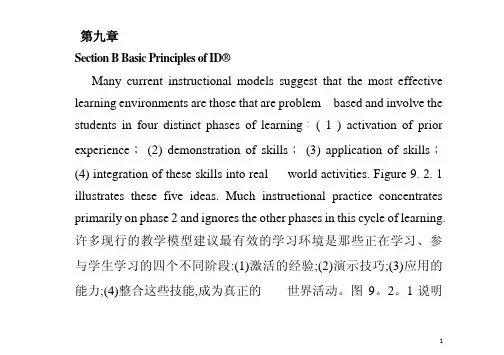
第九章Section B Basic Principles of ID®Many current instructional models suggest that the most effective learning environments are those that are problem—based and involve the students in four distinct phases of learning :(1)activation of prior experience;(2)demonstration of skills;(3)application of skills;(4)integration of these skills into real—world activities.Figure9.2.1 illustrates these five ideas.Much instruetional practice concentrates primarily on phase2and ignores the other phases in this cycle of learning.许多现行的教学模型建议最有效的学习环境是那些正在学习、参与学生学习的四个不同阶段:(1)激活的经验;(2)演示技巧;(3)应用的能力;(4)整合这些技能,成为真正的——世界活动。
图9。
2。
1说明了这些五的想法。
多instruetional实践集中主要在第二阶段,而忽略了其他方面在这个循环的学习。
At the too level.the instructional design prescriptions based on first principles are as follows ::(1〉Learning is facilitated when learners are engaged in solving real-world problems.在太水平。
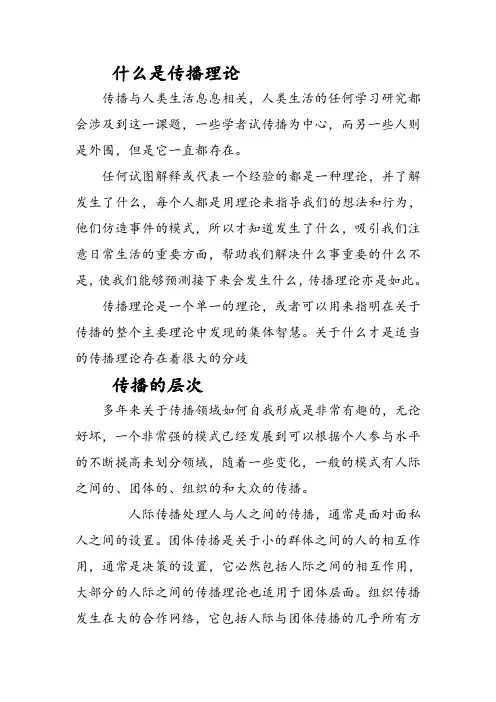
什么是传播理论传播与人类生活息息相关,人类生活的任何学习研究都会涉及到这一课题,一些学者试传播为中心,而另一些人则是外围,但是它一直都存在。
任何试图解释或代表一个经验的都是一种理论,并了解发生了什么,每个人都是用理论来指导我们的想法和行为,他们仿造事件的模式,所以才知道发生了什么,吸引我们注意日常生活的重要方面,帮助我们解决什么事重要的什么不是,使我们能够预测接下来会发生什么,传播理论亦是如此。
传播理论是一个单一的理论,或者可以用来指明在关于传播的整个主要理论中发现的集体智慧。
关于什么才是适当的传播理论存在着很大的分歧传播的层次多年来关于传播领域如何自我形成是非常有趣的,无论好坏,一个非常强的模式已经发展到可以根据个人参与水平的不断提高来划分领域,随着一些变化,一般的模式有人际之间的、团体的、组织的和大众的传播。
人际传播处理人与人之间的传播,通常是面对面私人之间的设置。
团体传播是关于小的群体之间的人的相互作用,通常是决策的设置,它必然包括人际之间的相互作用,大部分的人际之间的传播理论也适用于团体层面。
组织传播发生在大的合作网络,它包括人际与团体传播的几乎所有方面,它包括的课题如结构、组织的功能、人际关系、沟通和组织的过程与组织文化。
最后,通常大众传播通过调解来处理公共传播,在大众传播过程中涉及许多方面的人际的、团体的和组织的传播。
核心传播理论你会遇到许多关于处理传播的特殊方面的理论。
一些理论则解释了传播所独有的层面。
反之,其他的理论则关注了所有传播所共有的常规概念和一般过程。
我们就可以传播的一般处理方法为核心传播理论。
核心理论是特别有意义的,因为它帮助我们在大体上理解了传播。
不论传播在什么时候发生,核心理论都为传播活动的过程提供了见解。
以下的列表列举了核心传播理论的典型要素。
第一,核心理论告诉了我们传播的发展。
第二,核心理论强调了意义的产生与诠释。
第三,核心理论讨论信息结构,亦即信息的元素的组成成分,包括语言、文字与非语文的文本。
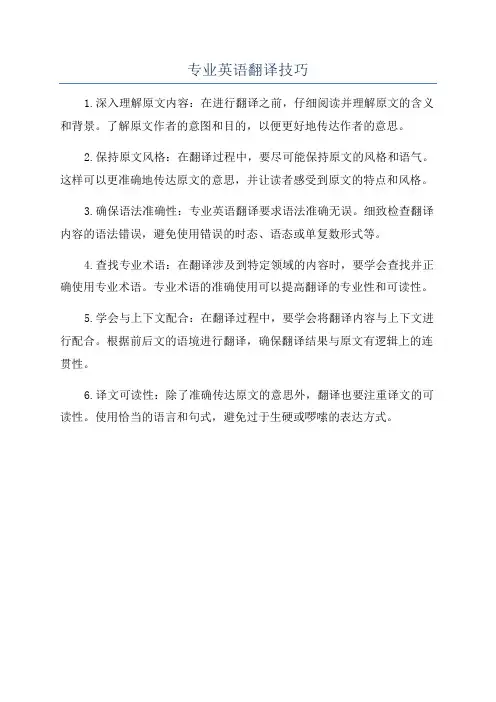
专业英语翻译技巧
1.深入理解原文内容:在进行翻译之前,仔细阅读并理解原文的含义和背景。
了解原文作者的意图和目的,以便更好地传达作者的意思。
2.保持原文风格:在翻译过程中,要尽可能保持原文的风格和语气。
这样可以更准确地传达原文的意思,并让读者感受到原文的特点和风格。
3.确保语法准确性:专业英语翻译要求语法准确无误。
细致检查翻译内容的语法错误,避免使用错误的时态、语态或单复数形式等。
4.查找专业术语:在翻译涉及到特定领域的内容时,要学会查找并正确使用专业术语。
专业术语的准确使用可以提高翻译的专业性和可读性。
5.学会与上下文配合:在翻译过程中,要学会将翻译内容与上下文进行配合。
根据前后文的语境进行翻译,确保翻译结果与原文有逻辑上的连贯性。
6.译文可读性:除了准确传达原文的意思外,翻译也要注重译文的可读性。
使用恰当的语言和句式,避免过于生硬或啰嗦的表达方式。
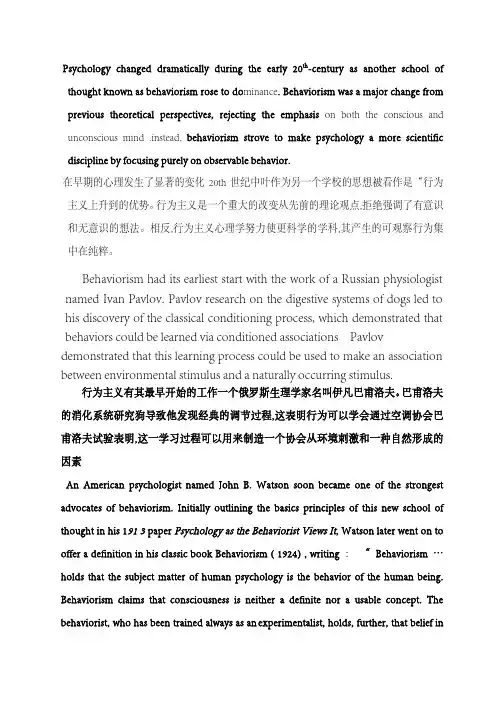
Psychology changed dramatically during the early20th-century as another school of thought known as behaviorism rose to do minance.Behaviorism was a major change from previous theoretical perspectives,rejecting the emphasis on both the conscious and unconscious mind.instead,behaviorism strove to make psychology a more scientific discipline by focusing purely on observable behavior.在早期的心理发生了显著的变化20th世纪中叶作为另一个学校的思想被看作是“行为主义上升到的优势。
行为主义是一个重大的改变从先前的理论观点,拒绝强调了有意识和无意识的想法。
相反,行为主义心理学努力使更科学的学科,其产生的可观察行为集中在纯粹。
Behaviorism had its earliest start with the work of a Russian physiologist named Ivan Pavlov.Pavlov research on the digestive systems of dogs led to his discovery of the classical conditioning process,which demonstrated that behaviors could be learned via conditioned associations Pavlov demonstrated that this learning process could be used to make an association between environmental stimulus and a naturally occurring stimulus.行为主义有其最早开始的工作一个俄罗斯生理学家名叫伊凡巴甫洛夫。
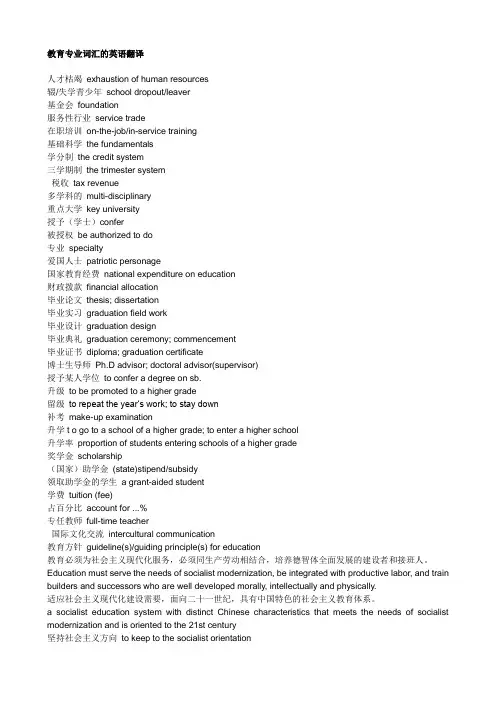
教育专业词汇的英语翻译人才枯竭exhaustion of human resources辍/失学青少年school dropout/leaver基金会foundation服务性行业service trade在职培训on-the-job/in-service training基础科学the fundamentals学分制the credit system三学期制the trimester system税收tax revenue多学科的multi-disciplinary重点大学key university授予(学士)confer被授权be authorized to do专业specialty爱国人士patriotic personage国家教育经费national expenditure on education财政拨款financial allocation毕业论文thesis; dissertation毕业实习graduation field work毕业设计graduation design毕业典礼graduation ceremony; commencement毕业证书diploma; graduation certificate博士生导师Ph.D advisor; doctoral advisor(supervisor)授予某人学位to confer a degree on sb.升级to be promoted to a higher grade留级to repeat the year‘s work; to stay down补考make-up examination升学t o go to a school of a higher grade; to enter a higher school升学率proportion of students entering schools of a higher grade奖学金scholarship(国家)助学金(state)stipend/subsidy领取助学金的学生a grant-aided student学费tuition (fee)占百分比account for ...%专任教师full-time teacher国际文化交流intercultural communication教育方针guideline(s)/guiding principle(s) for education教育必须为社会主义现代化服务,必须同生产劳动相结合,培养德智体全面发展的建设者和接班人。
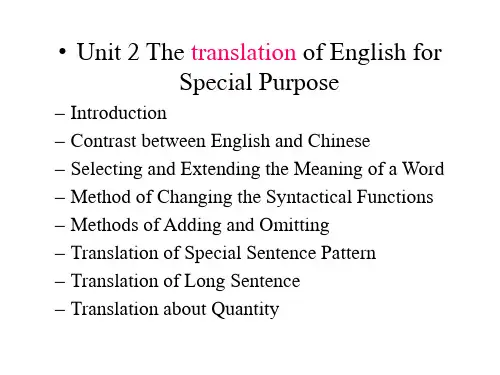
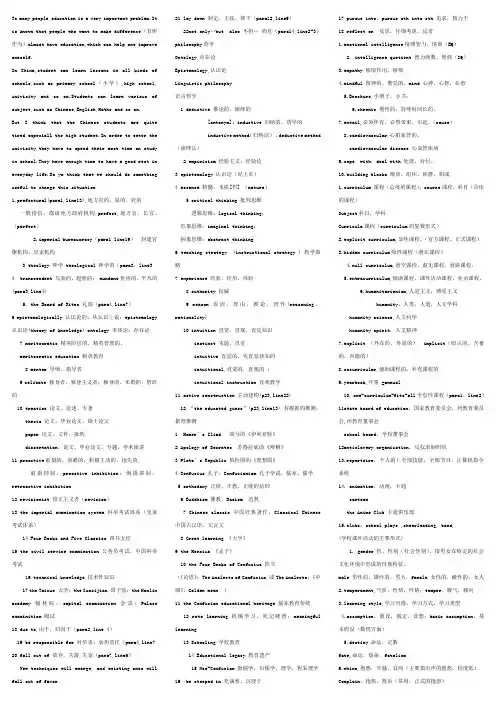
To many people,education is a very important problem.It is known that people who want to make difference(有所作为)almost have education,which can help one improve oneself.In China,student can learn lessons in all kinds of schools,such as primary school(小学),high school, univisity and so on.Students can learn various of subject,such as Chinese,English,Maths and so on.But I think that the Chinese students are quite tired,expeciall the high student.In order to enter the univisity,they have to spend their most time on study in school.They have enough time to have a good rest in everyday life.Do yo think that we should do something useful to change this situation1.prefectural(para1,line13),地方官的,显的,府的一般指县、郡级地方政府机构,prefect,地方官,长官。
(perfect)2.imperial bureaucracy(para1,line19)封建官僚机构,皇家机构3 theology 神学 theological 神学的(para3,line34 transcendent 先验的,超然的; mundane世俗的,平凡的(para3,line4)5. the Board of Rites 礼部(para4,line7)6 epistemologically 认识论的,从认识上说;epistemology 认识论(theory of knowledge) ontology 本体论;存在论7 meritocratic 精英阶层的,精英管理的,meritocratic education 精英教育8 mentor 导师,指导者9 celibate 独身者,独身主义者;独身的,未婚的,禁欲的10 treatise 论文、论述、专著thesis 论文,毕业论文,硕士论文paper 论文,文件,报纸dissertation,论文,毕业论文,专题,学术演讲11 proactive前摄的,前瞻的,积极主动的,抢先的,前摄抑制:proactive inhibition;倒摄抑制:retroactive inhibition12 revisionist 修正主义者(revision)13 the imperial examination system 科举考试体系(皇家考试体系)14 Four Books and Five Classics 四书五经15 the civil service examination 公务员考试,中国科举考试16 technical knowledge 技术性知识17 the Taixue 太学;the Guozijian 国子监;the Hanlin academy 翰林院;capital examination 会试;Palace examinition 殿试18 due to,由于,归因于(para2,line 4)19 be responsible for 对负责,承担责任(para4,line720 fall out of 放弃,失落,失宠(para7,line6)New techniques will emerge, and existing ones will fall out of favor 21 lay down 制定,主张,放下(para12,line9)22not only…but also 不但…而且(para14,line2-3)philosophy哲学Ontology,存在论Epistemology,认识论Linguistic philosophy语言哲学1 deductive 推论的,演绎的[antonym]: inductive 归纳的,诱导的inductive method(归纳法),deductive method(演绎法)2 empiricism 经验主义,经验论3 epistemology 认识论(见上页)4 essence 精髓,本质[哲] (nature)5 critical thinking 批判思维逻辑思维:logical thinking;形象思维:imaginal thinking;抽象思维:abstract thinking6 teaching strategy (instructional strategy ) 教学策略7 experience 经验,经历,体验8 authority 权威9 reason 原因,理由,推论,理性(reasoning,rationality)10 intuition 直觉,直观,直觉知识instinct 本能,直觉intuitive 直觉的,凭直觉获知的intuitional,直觉的,直观的;intuitional instruction 直观教学11 active construction 主动建构(p23,line22)12 “the educated guess”(p23,line13) 有根据的推测,据理推测1 Homer’s Iliad 荷马的《伊利亚特》2 Apology of Socrates 苏格拉底的《辩解》3 Plato’s Republic 柏拉图的《理想国》4 Confucius 孔子;Confucianism 孔子学说,儒家,儒学5 orthodoxy 正统、正教、正统的信仰6 Buddhism 佛教,Daoism 道教7 Chinese classic 中国经典著作,Classical Chinese中国古汉语、文言文8 Great learning 《大学》9 the Mencius 《孟子》10 the Four Books of Confucius 四书(《论语》:The Analects of Confucius,或The Analects;《中庸》:Golden mean )11 the Confucian educational heritage 儒家教育传统12 rote learning 机械学习,死记硬背;meaningfullearning13 Schooling 学校教育14 Educational legacy 教育遗产15 Neo-Confucian 新儒学,后儒学,理学,程朱理学16 be steeped in 充满着,沉浸于17 pursue into,pursue sth into sth 追求,致力于18 reflect on 反思,仔细考虑,反省1.emotional intelligence情绪智力,情商(EQ)2. intelligence quotient 智力商数,智商(IQ)3.empathy 移情作用,移情4.mindful 留神的,警觉的,mind 心神,心智,在意5.Brochure,小册子,小书,6.chronic 慢性的,持续时间长的,7.entail,必须伴有,必然带来,引起,(cause)8.cardiovascular,心脏血管的,cardiovascular disease 心血管疾病9.cope with;deal with 处理,对付。
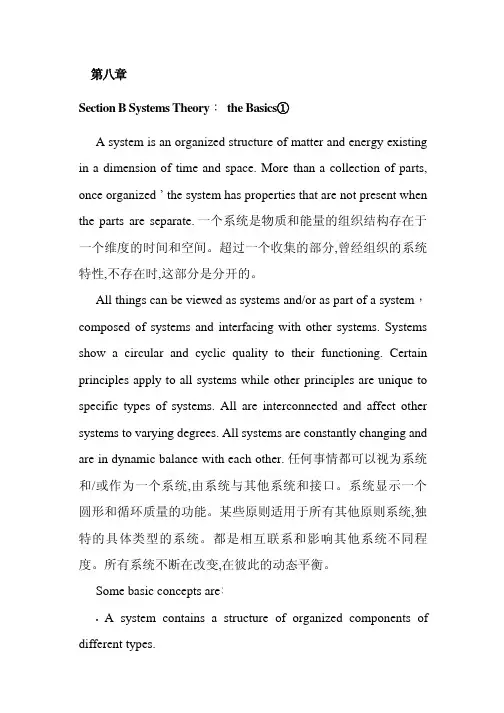
第八章Section B Systems Theory:the Basics①A system is an organized structure of matter and energy existing in a dimension of time and space.More than a collection of parts, once organized’the system has properties that are not present when the parts are separate.一个系统是物质和能量的组织结构存在于一个维度的时间和空间。
超过一个收集的部分,曾经组织的系统特性,不存在时,这部分是分开的。
All things can be viewed as systems and/or as part of a system,composed of systems and interfacing with other systems.Systems show a circular and cyclic quality to their functioning.Certain principles apply to all systems while other principles are unique to specific types of systems.All are interconnected and affect other systems to varying degrees.All systems are constantly changing and are in dynamic balance with each other.任何事情都可以视为系统和/或作为一个系统,由系统与其他系统和接口。
系统显示一个圆形和循环质量的功能。
某些原则适用于所有其他原则系统,独特的具体类型的系统。
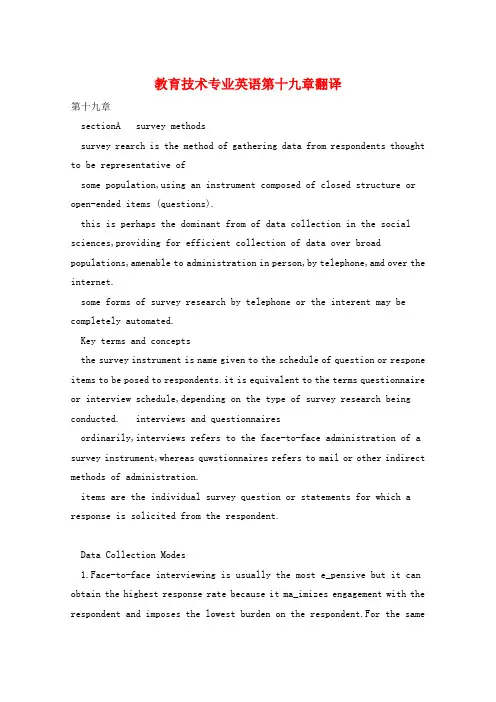
教育技术专业英语第十九章翻译第十九章sectionA survey methodssurvey rearch is the method of gathering data from respondents thought to be representative ofsome population,using an instrument composed of closed structure or open-ended items (questions).this is perhaps the dominant from of data collection in the social sciences,providing for efficient collection of data over broad populations,amenable to administration in person,by telephone,amd over the internet.some forms of survey research by telephone or the interent may be completely automated.Key terms and conceptsthe survey instrument is name given to the schedule of question or respone items to be posed to respondents.it is equivalent to the terms questionnaire or interview schedule,depending on the type of survey research being conducted. interviews and questionnairesordinarily,interviews refers to the face-to-face administration of a survey instrument,whereas quwstionnaires refers to mail or other indirect methods of administration.items are the individual survey question or statements for which a response is solicited from the respondent.Data Collection Modes1.Face-to-face interviewing is usually the most e_pensive but it can obtain the highest response rate because it ma_imizes engagement with the respondent and imposes the lowest burden on the respondent.For the samereasons,face-to-face interviews can support longer instruments.It is also the best data collection type for open-ended responses.2.Mail surveys are usually among the least e_pensive modes,are often best for sensitive items, and there is no interviewer bias.However,mail surveys are a poor choice for open-ended items or comple_ survey designs as they place a high burden on the respondent.3.Telephone interviewing has the advantage of speed of data collection while supporting longer instruments than mail surveys and supporting open-ended responses,though not as well as face-to-face interviewing.4.Web surveys are often the least e_pensive to administer yet can be fast of data collection,particularly since implementation time may be low.Web surveys can be administered to very large populations,even internally.调查研究的方法是收集数据从受访者认为是代表一些人口,使用一个仪器由封闭的结构或开放式项目(的问题)。
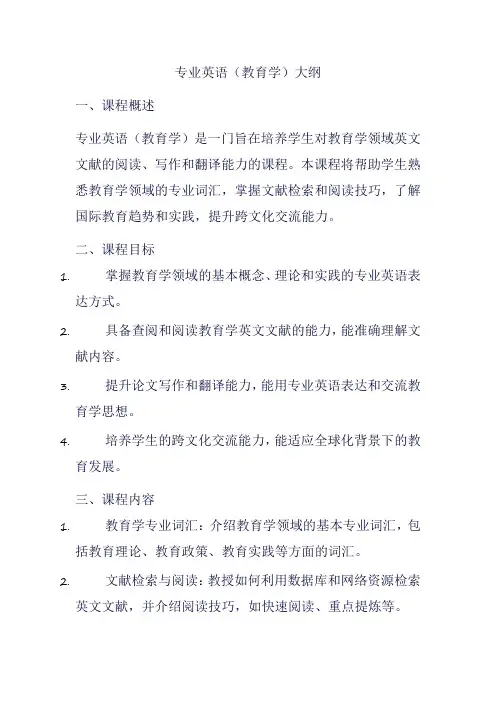
专业英语(教育学)大纲一、课程概述专业英语(教育学)是一门旨在培养学生对教育学领域英文文献的阅读、写作和翻译能力的课程。
本课程将帮助学生熟悉教育学领域的专业词汇,掌握文献检索和阅读技巧,了解国际教育趋势和实践,提升跨文化交流能力。
二、课程目标1.掌握教育学领域的基本概念、理论和实践的专业英语表达方式。
2.具备查阅和阅读教育学英文文献的能力,能准确理解文献内容。
3.提升论文写作和翻译能力,能用专业英语表达和交流教育学思想。
4.培养学生的跨文化交流能力,能适应全球化背景下的教育发展。
三、课程内容1.教育学专业词汇:介绍教育学领域的基本专业词汇,包括教育理论、教育政策、教育实践等方面的词汇。
2.文献检索与阅读:教授如何利用数据库和网络资源检索英文文献,并介绍阅读技巧,如快速阅读、重点提炼等。
3.论文写作与翻译:讲解如何撰写和翻译教育学领域的英文论文,包括论文结构、语言表达、语法和时态等方面的内容。
4.跨文化交流能力培养:通过案例分析、角色扮演等方式,培养学生的跨文化交流能力,包括沟通技巧、礼仪文化等。
5.教育学发展趋势与国际比较:介绍全球教育发展趋势和国际教育政策比较,帮助学生了解不同国家的教育制度和政策。
四、课程评价1.课堂参与度:鼓励学生积极参与课堂讨论,提问和回答问题,以及参与小组活动。
2.平时作业:布置相关阅读材料、翻译和写作作业,加强学生对课堂知识的理解和应用。
3.期末考试:通过笔试和口试相结合的方式,测试学生对课程内容的掌握程度和实际应用能力。
五、教师角色与职责1.提供清晰的学习目标和要求,确保学生了解课程内容和评价方式。
2.定期检查学生的学习进度和理解程度,及时给予反馈和建议。
3.提供学习资源和支持,包括推荐相关书籍、文章、网站等资源,为学生提供学术和情感支持。
4.鼓励学生的独立思考和创新精神,培养他们在教育学领域的知识和能力。
5.与学生保持积极沟通,解决学生在学习和生活中的问题,创造良好的学习环境。
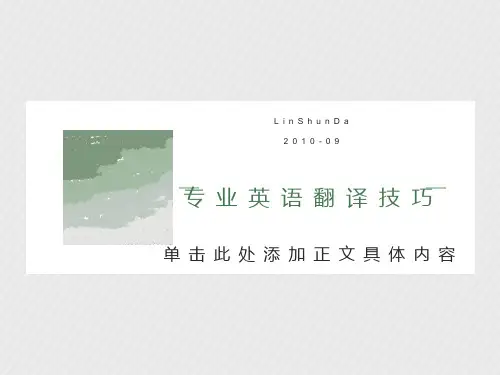
教育技术学专业英语课文翻译第十八章Chapter Eighteen: The Ethics of Teaching Technology第十八章:教学技术的伦理学Good teachers, administrators and educational technologists must be aware of their ethics while they teach and develop the use of technology in the classroom. In the current scene of teacher education, there is an ethical dimension attached to technology or information use that is not completely explored or understood. This chapter provides a basis for understanding the various ethical issues, which had been raised both in connection with technology and information.优秀的教师、行政人员和教育技术学家都必须意识到自己的伦理学在教学和发展课堂上的技术使用时。
在当前的教师教育场景中,与技术或信息使用相关联的伦理层面还未完全探索或理解。
本章给出了一个基础来理解不同的伦理问题,这些问题在技术和信息方面也有所提出。
The ethical dimension of the use of technology or data is complex and has yet to be fully explored. It is important tounderstand the ethical consequences of using technologies and/or requiring students to use technology. One of the main ethical issues raised is privacy. As software, hardware and the Internet are being used more and more frequently, it is important to be aware of the potential risks associated with the use of these technologies.使用技术或数据的伦理维度是复杂的,尚未得到充分的探索。
哲学Philosophy马克思主义哲学Philosophy of Marxism中国哲学Chinese Philosophy外国哲学Foreign Philosophies逻辑学Logic伦理学Ethics美学Aesthetics宗教学Science of Religion科学技术哲学Philosophy of Science and Technology经济学Economics理论经济学Theoretical Economics政治经济学Political Economy经济思想史History of Economic Thought经济史History of Economic西方经济学Western Economics世界经济World Economics人口、资源与环境经济学Population, Resources and Environmental Economics应用经济学Applied Economics国民经济学National Economics区域经济学Regional Economics财政学(含税收学)Public Finance (including Taxation)金融学(含保险学)Finance (including Insurance)产业经济学Industrial Economics国际贸易学International Trade劳动经济学Labor Economics统计学Statistics数量经济学Quantitative Economics中文学科、专业名称英文学科、专业名称国防经济学National Defense Economics法学Law法学Science of Law法学理论Jurisprudence法律史Legal History宪法学与行政法学Constitutional Law and Administrative Law刑法学Criminal Jurisprudence民商法学(含劳动法学、社会保障法学) Civil Law and Commercial Law (including Science of Labour Law and Science of Social Security Law )诉讼法学Science of Procedure Laws经济法学Science of Economic Law环境与资源保护法学Science of Environment and Natural Resources Protection Law国际法学(含国际公法学、国际私法学、国际经济法学、) International law (including International Public law, International Private Law and International Economic Law)军事法学Science of Military Law政治学Political Science政治学理论Political Theory中外政治制度Chinese and Foreign Political Institution科学社会主义与国际共产主义运动Scientific Socialism and InternationalCommunist Movement中共党史(含党的学说与党的建设) History of the Communist Party of China(including the Doctrine of China Party and Party Building)马克思主义理论与思想政治教育Education of Marxist Theory and Education in Ideology and Politics国际政治学International Politics国际关系学International Relations外交学Diplomacy社会学Sociology社会学Sociology人口学Demography人类学Anthropology民俗学(含中国民间文学) Folklore (including Chinese Folk Literature)民族学Ethnology民族学Ethnology马克思主义民族理论与政策Marxist Ethnic Theory and Policy中国少数民族经济Chinese Ethnic Economics中国少数民族史Chinese Ethnic History中国少数民族艺术Chinese Ethnic Art教育学Education教育学Education Science教育学原理Educational Principle课程与教学论Curriculum and Teaching Methodology教育史History of Education比较教育学Comparative Education学前教育学Pre-school Education高等教育学Higher Education成人教育学Adult Education职业技术教育学V ocational and Technical Education特殊教育学Special Education教育技术学Education Technology心理学Psychology基础心理学Basic Psychology发展与心理学Developmental and Educational Psychology应用心理学Applied Psychology体育学Science of Physical Culture and Sports体育人文社会学Humane and Sociological Science of Sports运动人体科学Human Movement Science体育教育训练学Theory of Sports Pedagogy and Training民族传统体育学Science of Ethnic Traditional Sports文学Literature中国语言文学Chinese Literature文艺学Theory of Literature and Art语言学及应用语言学Linguistics and Applied Linguistics汉语言文字学Chinese Philology中国古典文献学Study of Chinese Classical Text中国古代文学Ancient Chinese Literature中国现当代文学Modern and Contemporary Chinese Literature中国少数民族语言文学Chinese Ethnic Language and Literature比较文学与世界文学Comparative Literature and World Literature 外国语言文学Foreign Languages and Literatures英语语言文学English Language and Literature俄语语言文学Russian Language and Literature法语语言文学French Language and Literature德语语言文学German Language and Literature日语语言文学Japanese Language and Literature印度语言文学Indian Language and Literature西班牙语语言文学Spanish Language and Literature阿拉伯语语言文学Arabic Language and Literature欧洲语言文学European Language and Literature亚非语言文学Asian-African Language and Literature外国语言学及应用语言学Linguistics and Applied Linguistics in Foreign Languages新闻传播学Journalism and Communication新闻学Journalism传播学Communication艺术学Art艺术学Art Theory音乐学Music美术学Fine Arts设计艺术学Artistic Design戏剧戏曲学Theater and Chinese Traditional Opera电影学Film广播电视艺术学Radio and television Art舞蹈学Dance历史学History历史学History史学理论及史学史Historical Theories and History of Historical Science考古学及博物馆学Archaeology and Museology历史地理学Historical Geography历史文献学(含敦煌学、古文字学) Studies of Historical Literature (including Paleography and Studies of Dunhuang)专门史History of Particular Subjects中国古代史Ancient Chinese History中国近现代史Modern and Contemporary Chinese History世界史World History理学Natural Science数学Mathematics基础数学Fundamental Mathematics计算数学Computational Mathematics概率论与数理统计Probability and Mathematical Statistics应用数学Applied mathematics运筹学与控制论Operational Research and Cybernetics物理学Physics理论物理Theoretical Physics粒子物理与原子核物理Particle Physics and Nuclear Physics原子与分子物理Atomic and Molecular Physics等离子体物理Plasma Physics凝聚态物理Condensed Matter Physics声学Acoustics光学Optics无线电物理Radio Physics化学Chemistry无机化学Inorganic Chemistry分析化学Analytical Chemistry有机化学Organic Chemistry物理化学(含化学物理)Physical Chemistry (including Chemical Physics) 高分子化学与物理Chemistry and Physics of Polymers天文学Astronomy天体物理Astrophysics天体测量与天体力学Astrometry and Celestial Mechanics地理学Geography自然地理学Physical Geography人文地理学Human Geography地图学与地理信息系统Cartography and Geography Information System大气科学Atmospheric Sciences气象学Meteorology大气物理学与大气环境Atmospheric Physics and Atmospheric Environment 海洋科学Marine Sciences物理海洋学Physical Oceanography海洋化学Marine Chemistry海洋生理学Marine Biology海洋地质学Marine Geology地球物理学Geophysics固体地球物理学Solid Earth Physics空间物理学Space Physics地质学Geology矿物学、岩石学、矿床学Mineralogy, Petrology, Mineral Deposit Geology 地球化学Geochemistry古生物学与地层学(含古人类学)Paleontology and Stratigraphy (including Paleoanthropology)构造地质学Structural Geology第四纪地质学Quaternary Geology生物学Biology植物学Botany动物学Zoology生理学Physiology水生生物学Hydrobiology微生物学Microbiology神经生物学Neurobiology遗传学Genetics发育生物学Developmental Biology细胞生物学Cell Biology生物化学与分子生物学Biochemistry and Molecular Biology生物物理学Biophysics生态学Ecology系统科学Systems Science系统理论Systems Theory系统分析与集成Systems Analysis and Integration科学技术史History of Science and Technology工学Engineering力学Mechanics一般力学与力学基础General and Fundamental Mechanics固体力学Solid Mechanics流体力学Fluid Mechanics工程力学Engineering Mechanics机械工程Mechanical Engineering机械制造及其自动化Mechanical Manufacture and Automation机械电子工程Mechatronic Engineering机械设计与理论Mechanical Design and Theory车辆工程Vehicle Engineering光学工程Optical Engineering仪器科学与技术Instrument Science and Technology精密仪器及机械Precision Instrument and Machinery测试计量技术及仪器Measuring and Testing Technologies and Instruments 材料科学与工程Materials Science and Engineering材料物理与化学Materials Physics and Chemistry材料学Materialogy材料加工工程Materials Processing Engineering冶金工程Metallurgical Engineering冶金物理化学Physical Chemistry of Metallurgy钢铁冶金Ferrous Metallurgy有色金属冶金Non-ferrous Metallurgy动力工程及工程热物理Power Engineering and Engineering Thermophysics 工程热物理Engineering Thermophysics热能工程Thermal Power Engineering动力机械及工程Power Machinery and Engineering流体机械及工程Fluid Machinery and Engineering制冷及低温工程Refrigeration and Cryogenic Engineering化工过程机械Chemical Process Equipment电气工程Electrical Engineering电机与电器Electric Machines and Electric Apparatus电力系统及其自动化Power System and its Automation高电压与绝缘技术High V oltage and Insulation Technology电力电子与电力传动Power Electronics and Power Drives电工理论与新技术Theory and New Technology of Electrical Engineering电子科学与技术Electronics Science and Technology物理电子学Physical Electronics电路与系统Circuits and Systems微电子学与固体电子学Microelectronics and Solid State Electronics电磁场与微波技术Electromagnetic Field and Microwave Technology信息与通信工程Information and Communication Engineering通信与信息系统Communication and Information Systems信号与信息处理Signal and Information Processing控制科学与工程Control Science and Engineering控制理论与控制工程Control Theory and Control Engineering检测技术与自动化装置Detection Technology and Automatic Equipment系统工程Systems Engineering模式识别与智能系统Pattern Recognition and Intelligent Systems导航、制导与控制Navigation, Guidance and Control计算机科学与技术Computer Science and Technology计算机软件与理论Computer Software and Theory计算机系统结构Computer Systems Organization计算机应用技术Computer Applied Technology建筑学Architecture建筑历史与理论Architectural History and Theory建筑设计及其理论Architectural Design and Theory城市规划与设计(含风景园林规划与设计)Urban Planning and Design (including Landscape Planning and Design)建筑技术科学Building Technology Science土木工程Civil Engineering岩土工程Geotechnical Engineering结构工程Structural Engineering市政工程Municipal Engineering供热、供燃气、通风及空调工程Heating, Gas Supply, Ventilating and Air Conditioning Engineering防灾减灾工程及防护工程Disaster Prevention and Reduction Engineering and Protective Engineering桥梁与隧道工程Bridge and Tunnel Engineering水利工程Hydraulic Engineering水文学及水资源Hydrology and Water Resources水力学及河流动力学Hydraulics and River Dynamics水工结构工程Hydraulic Structure Engineering水利水电工程Hydraulic and Hydro-Power Engineering港口、海岸及近海工程Harbor, Coastal and Offshore Engineering测绘科学与技术Surveying and Mapping大地测量学与测量工程Geodesy and Survey Engineering摄影测量与遥感Photogrammetry and Remote Sensing地图制图学与地理信息工程Cartography and Geographic Information Engineering 化学工程与技术Chemical Engineering and Technology化学工程Chemical Engineering化学工艺Chemical Technology生物化工Biochemical Engineering应用化学Applied Chemistry工业催化Industrial Catalysis地质资源与地质工程Geological Resources and Geological Engineering矿产普查与勘探Mineral Resource Prospecting and Exploration地球探测与信息技术Geodetection and Information Technology地质工程Geological Engineering矿业工程Mineral Engineering采矿工程Mining Engineering矿物加工工程Mineral Processing Engineering安全技术及工程Safety Technology and Engineering石油与天然气工程Oil and Natural Gas Engineering油气井工程Oil-Gas Well Engineering油气田开发工程Oil-Gas Field Development Engineering油气储运工程Oil-Gas Storage and Transportation Engineering纺织科学与工程Textile Science and Engineering纺织工程Textile Engineering纺织材料与纺织品设计Textile Material and Textiles Design纺织化学与染整工程Textile Chemistry and Dyeing and Finishing Engineering服装设计与工程Clothing Design and Engineering轻工技术与工程The Light Industry Technology and Engineering制浆造纸工程Pulp and Paper Engineering制糖工程Sugar Engineering发酵工程Fermentation Engineering皮革化学与工程Leather Chemistry and Engineering交通运输工程Communication and Transportation Engineering道路与铁道工程Highway and Railway Engineering交通信息工程及控制Traffic Information Engineering & Control交通运输规划与管理Transportation Planning and Management载运工具运用工程Vehicle Operation Engineering船舶与海洋工程Naval Architecture and Ocean Engineering船舶与海洋结构物设计制造Design and Construction of Naval Architecture and Ocean Structure 轮机工程Marine Engine Engineering水声工程Underwater Acoustics Engineering航空宇航科学与技术Aeronautical and Astronautical Science and Technology飞行器设计Flight Vehicle Design航空宇航推进理论与工程Aerospace Propulsion Theory and Engineering航空宇航器制造工程Manufacturing Engineering of Aerospace Vehicle人机与环境工程Man-Machine and Environmental Engineering兵器科学与技术Armament Science and Technology武器系统与运用工程Weapon Systems and Utilization Engineering兵器发射理论与技术Armament Launch Theory and Technology火炮、自动武器与弹药工程Artillery, Automatic Gun and Ammunition Engineering军事化学与烟火技术Military Chemistry and Pyrotechnics核科学与技术Nuclear Science and Technology核能科学与工程Nuclear Energy Science and Engineering核燃料循环与材料Nuclear Fuel Cycle and Materials核技术及应用Nuclear Technology and Applications辐射防护及环境保护Radiation and Environmental Protection农业工程Agricultural Engineering农业机械化工程Agricultural Mechanization Engineering农业水土工程Agricultural Water-Soil Engineering农业生物环境与能源工程Agricultural Biological Environmental and Energy Engineering农业电气化与自动化Agricultural Electrification and Automation林业工程Forestry Engineering森林工程Forest Engineering木材科学与技术Wood Science and Technology林产化学加工工程Chemical Processing Engineering of Forest Products环境科学与工程Environmental Science and Engineering环境科学Environmental Science环境工程Environmental Engineering生物医学工程Biomedical Engineering食品科学与工程Food Science and Engineering食品科学Food Science粮食、油脂及植物蛋白工程Cereals, Oils and Vegetable Protein Engineering农产品加工及贮藏工程Processing and Storage of Agriculture Products水产品加工及贮藏工程Processing and Storage of Aquatic Products农学Agriculture作物学Crop Science作物栽培学与耕作学Crop Cultivation and Farming System作物遗传育种学Crop Genetics and Breeding园艺学Horticulture果树学Pomology蔬菜学Olericulture茶学Tea Science农业资源利用学Utilization Science of Agricultural Resources土壤学Soil Science植物营养学Plant Nutrition植物保护学Plant Protection植物病理学Plant Pathology农业昆虫与害虫防治Agricultural Entomology and Pest Control农药学Pesticide Science畜牧学Animal Science动物遗传育种与繁殖Animal Genetics, Breeding and ReproductionScience动物营养与饲料科学Animal Nutrition and Feed Science草业科学Practaculture Science特种经济动物饲养学(含蚕、蜂等)The Rearing of Special-type Economic Animals (including Silkworm, Honeybees, etc.)兽医学Veterinary Medicine基础兽医学Basic Veterinary Medicine预防兽医学Preventive Veterinary Medicine临床兽医学Clinical Veterinary Medicine林学Forestry林木遗传育种学Forest Tree Genetics and Breeding森林培育学Silviculture森林保护学Forest Protection森林经理学Forest Management野生动植物保护与利用Wildlife Conservation and Utilization园林植物与观赏园艺Ornamental Plants and Horticulture水土保持与荒漠化防治Soil and Water Conservation and Desertification Combating 水产学Fisheries Science水产养殖学Aquaculture Science捕捞学Fishing Science渔业资源学Science of Fisheries Resources医学Medicine基础医学Basic Medicine人体解剖与组织胚胎学Human Anatomy, Histology and Embryology免疫学Immunology病原生物学Pathogenic Organisms病理学与病理生理学Pathology and Pathophysiology法医学Forensic Medicine放射医学Radiation Medicine航空航天与航海医学Aerospace and Nautical medicine临床医学Clinical Medicine内科学(含心血管病学、血液病学、呼吸系病学、消化系病学、内分泌与代谢病学、肾脏病学、风湿病学、传染病学)Internal medicine (including Cardiology, Hematology, Respiratory, Gastroenterology, Endocrinology and Metabolism, Nephrology, Rheuma-tology, Infectious Diseases)儿科学Pediatrics老年医学Geriatrics神经病学Neurology精神病与精神卫生学Psychiatry and Mental Health皮肤病与性病学Dermatology and Venereology影像医学与核医学Imaging and Nuclear Medicine临床检验诊断学Clinical Laboratory Diagnostics护理学Nursing外科学(含普通外科学、骨外科学、泌尿外科学、胸心血管外科学、神经外科学、整形外科学、烧伤外科学、野战外科学)Surgery (General Surgery, Orthopedics, Urology, Cardiothoracic Surgery, Neurosurgery, Plastic Surgery, Burn Surgery, Field Surgery)妇产科学Obstetrics and Gynecology眼科学Ophthalmic Specialty耳鼻咽喉科学Otolaryngology肿瘤学Oncology康复医学与理疗学Rehabilitation Medicine & Physical Therapy运动医学Sports Medicine麻醉学Anesthesiology急诊医学Emergency Medicine口腔医学Stomatology口腔基础医学Basic Science of Stomatology口腔临床医学Clinical Science of Stomatology公共卫生与预防医学Public Health and Preventive Medicine流行病与卫生统计学Epidemiology and Health Statistics劳动卫生与环境卫生学Occupational and Environmental Health营养与食品卫生学Nutrition and Food Hygiene儿少卫生与妇幼保健学Maternal, Child and Adolescent Health卫生毒理学Hygiene Toxicology军事预防医学Military Preventive Medicine中医学Chinese Medicine中医基础理论Basic Theories of Chinese Medicine中医临床基础Clinical Foundation of Chinese Medicine中医医史文献History and Literature of Chinese Medicine方剂学Formulas of Chinese Medicine中医诊断学Diagnostics of Chinese Medicine中医内科学Chinese Internal Medicine中医外科学Surgery of Chinese Medicine中医骨伤科学Orthopedics of Chinese Medicine中医妇科学Gynecology of Chinese Medicine中医儿科学Pediatrics of Chinese Medicine中医五官科学Ophthalmology and Otolaryngoloy of Chinese Medicine针灸推拿学Acupuncture and Moxibustion and Tuina of Chinese medicine民族医学Ethnomedicine中西医结合医学Chinese and Western Integrative Medicine中西医结合基础医学Basic Discipline of Chinese and Western Integrative中西医结合临床医学Clinical Discipline of Chinese and Western Integrative Medicine 药学Pharmaceutical Science药物化学Medicinal Chemistry药剂学Pharmaceutics生药学Pharmacognosy药物分析学Pharmaceutical Analysis微生物与生化药学Microbial and Biochemical Pharmacy药理学Pharmacology中药学Science of Chinese Pharmacology军事学Military Science军事思想学及军事历史学Military Thought and Military History军事思想学Military Thought军事历史学Military History战略学Science of Strategy军事战略学Military Strategy战争动员学War Mobilization战役学Science of Operations联合战役学Joint Operation军种战役学(含第二炮兵战役学)Armed Service Operation (including Operation of Strategic Missile Force)战术学Science of Tactics合同战术学Combined-Arms Tactics兵种战术学Branch Tactics军队指挥学Science of Command作战指挥学Combat Command军事运筹学Military Operation Research军事通信学Military Communication军事情报学Military Intelligence密码学Cryptography军事教育训练学(含军事体育学)Military Education and Training (including Military Physical Training)军制学Science of Military System军事组织编制学Military Organizational System军队管理学Military Management军队政治工作学Science of Military Political Work军事后勤学与军事装备学Science of Military Logistics and Military Equipment军事后勤学Military Logistics后方专业勤务Rear Special Service军事装备学Military Equipment管理学Management Science管理科学与工程Management Science and Engineering工商管理学Science of Business Administration会计学Accounting企业管理学(含财务管理、市场营销学、人力资源管理学)Corporate Management (including Financial Management, Marketing, and Human Resources Management)旅游管理学Tourist Management技术经济及管理学Technology Economy and Management农林经济管理学Agricultural and Forestry Economics & Management农业经济管理学Agricultural Economics & Management林业经济管理学Forestry Economics & Management公共管理学Science of Public Management行政管理学Administration Management社会医学与卫生事业管理学Social Medicine and Health Management教育经济与管理学Educational Economy and Management社会保障学Social Security土地资源管理学Land Resource Management图书馆、情报与档案学Science of Library, Information and Archival 图书馆学Library Science情报学Information Science档案学Archival Science。
第一章教育技术学历史第一节20世纪20年代之前支持教育技术学的一个基本原理是基于经验主义原则,这些原则能产生明显有效的教学。
同时许多奉献都能够被列举出来作为重要的流行的教育观念,美国哥伦比亚大学的行为主义心理学家桑代克对教育技术学这一领域可能是最具权威和特别重要的。
做为较早的致力于人类学习研究,特别是为教育技术学建立科学知识体系,桑代克是重要的。
另一个支持教育技术学的观念是进步主义理论。
这个理论是建立在教育哲学的基础之上的并且与这一领域最具相关的。
进步主义认为经验是理解的关键同时“个人拥有的最重要的力量是他可以共享的经验才能,这些经验解决了由先天智力手段引起的无数问题”。
这应该是教育技术学领域所遵循的模式。
在早期,听觉教学和视听教学被看做是传统教学方法过度言语主义的解决方法。
应用在教育中的支持经验主义的新媒体为概念思维提供了有形的基础,使得学习更加持久,促进了思维的连续性,促进了学习的意义,效率,深度和广度的发展。
第二节20世纪20年代到20世纪40年代视听运动的发起可以追溯到20世纪早期学校和博物馆开始使用视觉符号比方图画,印刷品,幻灯片,电影和模型来支持口语教学。
随着成为正式课程视觉教学运动中在1918年到1928年间得到了巨大的成长,视觉教育领域的专业组织和期刊,研究报告,还有管理单位也逐步形成。
一些例子包括:〔1〕视觉教学的国家研究院在1919年成立。
〔2〕美国的教育电影也在1919年成立;〔3〕可视化教学部在1923年建成;〔4〕美国视觉化教学协会在1922年成立。
在这一时期,很多大事件的发生影响着视听教学运动的未来发展,行为目标运动就是其中之一。
在早期的提倡使用明确目标的人有博比特,查特斯,伯克。
然而,拉尔夫泰勒被认为是行为目标运动之父。
在1933年,在泰勒的指导下,“八年研究”在俄亥俄州立大学启动。
八年报告作为教育技术历史的一部分有两个显著地原因。
首先,这个报告细化了书写教学目标的方法。